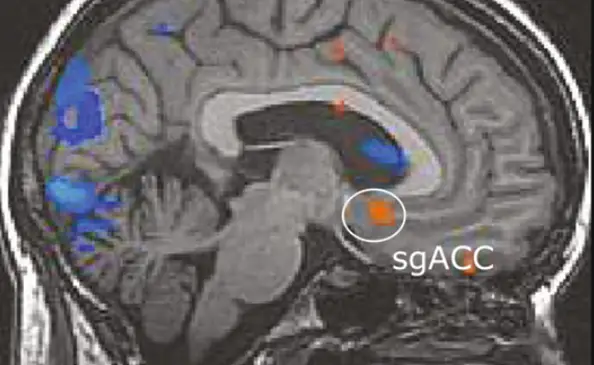Rumination and Narcissistic Abuse
Rumination is named after ruminant animals who re-chew their food. It is an unpleasant experience of repetitive thinking that causes disagreeable emotions such as guilt, shame, anxiety, and depression.
Rumination is common during and after emotional abuse from a narcissist. It happens to everyone but is especially common in depression and anxiety. It is a self-fulfilling prophecy as the more you ruminate, the more worn the neural pathways by which one ruminates become.
Having a better understanding of rumination can help you break free of narcissistic abuse and move on to a healthier mind frame.
Neurobiological Correlate of Rumination
Understanding what happens in your brain when you ruminate can help alleviate rumination. Of course, the amygdala is involved (as it is involved in the fight, flight, freeze, and fawn pathways), and a certain area of the prefrontal cortex (subgenual) becomes enlarged in chronic ruminators. Also involved is the default mode network (DMN), which is active when you are daydreaming or lost in self-referential thought.
Increased connectivity between the subgenual prefrontal cortex and DMN creates a vicious cycle of rumination. Neuroplasticity teaches us that what fires together wires together. Interrupting and replacing the movie continuously playing in your head is the first step to decreasing rumination.
Strategies to Interrupt Rumination
Common sense strategies to interrupt rumination include distraction. Going for a walk or any form of self-care can help break the bonds of rumination. Meditation is particularly effective, though it takes practice to quiet the mind actively. Any activity stimulating the vagal nerve (deep breathing, tapping, etc) is useful to de-regulate an overactive amygdala. Mindfulness can be a useful tool, but it is also challenging amid an anxiety or depression-invoking cycle.
If you are having euphoric rumination (remember the love bombing), reviewing your list of all the ways the narcissist hurt you can be useful. On the flip side, if you have versions of revenge strategies, it may be best to remember that the best revenge is to move on and live your best life rather than give him or her another second thought.
Rumination keeps you from living an authentic life; ultimately, you must let go.
What is Rumination?
Rumination is repeatedly thinking about a problem or thought. It is associated with anxiety and depression and can overwhelm you.
Formally defined as “a repetitive thought process in which an individual obsessively thinks about the causes, consequences, and symptoms of their distress,” rumination is like a bad movie you keep seeing in your mind.
Problems associated with rumination include:
- Difficulty concentrating
- Lack of motivation
- Negative thought patterns
- Trouble sleeping
- Low self-worth
- Impulsive behavior
- Social isolation
What causes Rumination?
Rumination is common and can be caused by past trauma (either Trauma or small t trauma), stress, low self-worth, and perfectionism. It is most commonly seen in depression and anxiety.
As with anxiety, there are perfectly logical evolutionary reasons to ruminate. Rumination, like anxiety, can become excessive, take over your thoughts, and dominate your mood.
Break the Rumination Cycle
To break the rumination cycle, it is necessary first to notice you are ruminating and then change the neural circuitry driving it.
Meta-awareness is first. Being aware of your thoughts takes time and usually requires significant mindfulness practice. Once you know you are ruminating, figure out how to laugh at yourself.
Like a Boggart in Harry Potter, if you can take a thought, make it absurd, and laugh at yourself, you can change the neural pathways driving the rumination cycle.
Next, replace the thought with something positive.
Finally, self-compassion and self-kindness help to restore a sense of normalcy. This is self-care.
I had a trigger that I ruminated on for more than six months after I left a covert narcissist. Initially, after extensive reading about covert narcissism and learning how to yellow rock, I did visualization exercises and inner child work. EMDR from a trauma-informed therapist helped, but finally, a single session of NLP removed the trigger.
Traditional therapy and journaling are useful. Relaxation techniques and breathing exercises are numerous and serve to increase vagal tone.
Rumination and Narcissistic Abuse
After narcissistic abuse, rumination is expected. This feedback loop will consume you and cause cycles of anger or shame. It feels like you are stuck and cannot move on. Rumination is a self-perpetuating vicious cycle.
In the wake of narcissistic abuse, you naturally ruminate because the narcissist trained you to. After years or decades of trauma, you are unable to let go of negative thoughts, and perseveration and rumination are natural. In essence, you were conditioned to ruminate by the narcissist.
This happens as they recurrently bring up issues that you thought were previously resolved. Dog Whistling is another way they program you to ruminate. But it is the love bombing–discarding cycle that cements rumination in your mind. Crazymaking and gaslighting also lead to ruminative cycles.
Conclusion
Rumination is correlated with an active amygdala.
Like most thoughts and emotions, resistance will make it worse. It is necessary to experience, accept, and feel any feelings that come up. Don’t stuff your emotions down and repress your thoughts.
Notice, process, be kind to yourself, and let the feelings go. Let the thoughts go. Wish them well and laugh at yourself. Remember that rumination is a Boggart.
Meditation is a perfect tool for ruminators and anyone with an active amygdala.
Remember, the story you are telling yourself right now is just a story, not the truth. Be kind, and let that go too.
